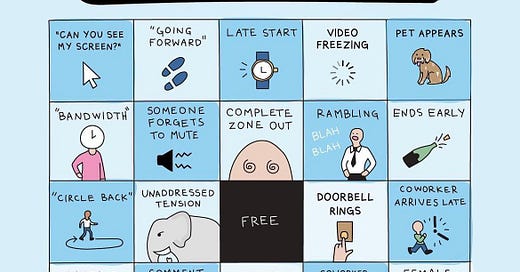Read
Stop feeling guilty about delegating (HBR)
If nothing else, print out this headline and tape it to your monitor. As a working parent, delegation is essential to success—both at work and at home. Yet, many still struggle with it. This article provides some thoughtful tips for managing delegation guilt:
Distinguish between justified and unjustified guilt. As the author says, “If you’re not hurting someone or contradicting your morals, your guilt is likely unjustified.”
Reframe delegation—instead of viewing it as burdening someone else, view it, instead, as an opportunity for learning, spotlighting, and growth. I think about this a lot with my kids. For example, when I have my second grader make his own lunch, I’m not only taking a task off my own plate, I’m empowering him to take responsibility for himself. Win-win!
Monitor your own delegation skills. The author suggests asking direct questions like, “Where am I too involved?” and “Where do you need me to be more involved?”
Help your teammates prioritize so they aren’t overwhelmed by delegated tasks.
I am a better mother when my kid is in school (Romper)
There’s an old saying, “to be more of a mother, you have to be more than a mother”. Since the start of COVID, many moms (and dads, too) have struggled to find opportunities to nurture their own sense of self. This heart-felt essay about the importance of having time away from our kids—and the benefits of being able to miss them—resonates particularly strongly at the beginning of the new school year.
Companies are cutting back on maternity and paternity leave (Wall Street Journal)
This was incredibly frustrating to read. According to new survey data from the Society for Human Resource Management, the share of companies offering additional paid maternity leave, beyond what is legally required, dropped from 53% in 2020 to 35% in 2022. Furthermore, only 27% of companies surveyed are offering paid paternity leave in 2022, down from the high of 44% in 2020.
Yes, companies are nervous about the potential recession, but this is undoubtedly the wrong direction. Data consistently shows that increased length of maternity leave is tied to increased retention of women in the workforce. Cutting costs, at working parents’ expense, will prove to have disastrous outcomes.
What you need to know about paid leave before the midterms (Marie Claire)
If the previous article left you angry and desiring change, then this interview with Dawn Hucklebridge, director of Paid Leave for All Action, may provide some hope. As demonstrated above, it is dangerous to rely solely on private companies to provide paid leave—federal paid leave is imperative. As Dawn states in the interview:
Paid leave is one of the most widely supported policies in this country. Two-thirds of small businesses want a national program. In battleground states, supermajorities of voters want paid leave passed now, including 94 percent of Democratic women, 71 percent of Independent women, and 61 percent of Republican women. Suburban women in these states wanted paid leave more than any other policy on the table. Women's votes matter tremendously. And they determine elections. [emphasis added]
Don’t teach your kids to fear the world (The Atlantic)
In an effort to keep their kids safe, many parents teach their kids that the world is dangerous—thinking that it will make them more cautious. In fact, research has shown the opposite to be true. Teaching kids that the world is a fundamentally unsafe place can make them more suspicious of others, less tolerant of groups who hold different identities, and less likely to take real threats seriously (since everything is perceived as a potential threat, they become desensitized).
Connect
I bought these TableTopic conversation cards a few months ago, and they get a surprising amount of use in our family! I tend to get a lot of blank stares when I ask questions like, “what’s new in your life?” or “tell me about your day!”, so I appreciate that these cards start conversations in a fun and non-threatening way. My second-grader even reaches for these during a visit with extended family members or when a babysitter is over.
Questions range from whimsical (“which animal would you love to be for a day?”) to philosophical (“do you learn more when you win or when you lose?”), to fun (“what’s the best junk food ever created?”) and poignant (“How can adults show respect to children?”)
Note: I’m not paid in any way to promote this, it’s just a product I genuinely like 👍
Reflect
This cartoon encapsulates one of the biggest struggles of parenthood. We want our kids to be confident and independent… except when it’s inconvenient for us (which is often, when they’re young and headstrong). I’m in the thick of this struggle myself, so have no magic wand solution to offer. But, when I notice myself getting frustrated by my kids asserting themselves, I try to refocus on my long-term goal: I want them to be independent and self-assured advocates for themselves.
Next time you find yourself getting frustrated with your child’s desire for independence, ask yourself the following questions:
What is this bringing up for me? Why am I reacting so strongly? Who is this really about?
Is there another way that I can interpret this behavior?
What specific behaviors do I want to reinforce? What behaviors do I want to modify? Is there a way I can help my child hone his/her message or delivery to be more effective at self-advocating?
I want to cover what’s important to YOU. I welcome reader input in deciding what and who to write about. Email me at drjessicawilen [at] gmail [dot] com and put “newsletter idea” in the subject.







Ooh, love the concept of that article from the Atlantic. And that comic about assertiveness is soooo good.
This was an awesome roundup of resources, Jessica. And I second the TableTalk cards -- we have a handful of cards of this type, not limited to TableTalk ones, and pull them out once in awhile when our dinnertime conversations aren't going anywhere.